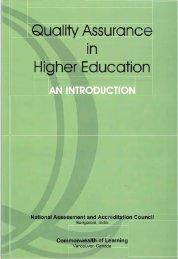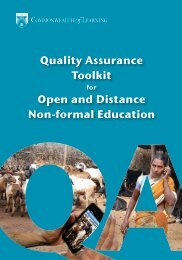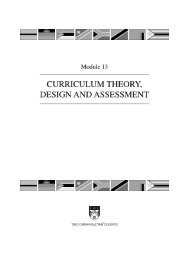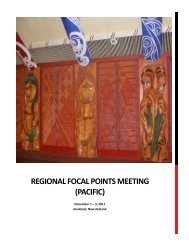Tech-MODE for Agricultural Education and Improved Livelihoods in ...
Tech-MODE for Agricultural Education and Improved Livelihoods in ...
Tech-MODE for Agricultural Education and Improved Livelihoods in ...
Create successful ePaper yourself
Turn your PDF publications into a flip-book with our unique Google optimized e-Paper software.
SYNTHESIS OF EIGHT COUNTRY CASE STUDIES<br />
diversity of <strong>in</strong><strong>for</strong>mal <strong>and</strong> <strong>for</strong>mal tra<strong>in</strong><strong>in</strong>g <strong>and</strong> education also exists <strong>in</strong> Ghana <strong>and</strong><br />
Nigeria.<br />
Several countries offer agricultural experience at primary level through school<br />
gardens as <strong>in</strong> the case of Cameroon <strong>and</strong> Ghana. At the junior <strong>and</strong> senior secondary<br />
level, agricultural education may be optional or compulsory, depend<strong>in</strong>g on the<br />
country. In Ghana, <strong>for</strong> example, agriculture starts at junior level as a compulsory<br />
subject. It becomes optional at the senior level. In Nigeria, agriculture is a compulsory<br />
subject <strong>in</strong> the new n<strong>in</strong>e-year basic education curriculum <strong>for</strong> primary <strong>and</strong> secondary<br />
schools. In Sierra Leone, the ten-year rebel war affected school<strong>in</strong>g. Nevertheless,<br />
agricultural education is compulsory at all senior secondary schools. In Kenya <strong>and</strong><br />
Ug<strong>and</strong>a, agriculture is optional at secondary level. In Cameroon, “… there is no<br />
strongly en<strong>for</strong>ced government policy on agricultural tra<strong>in</strong><strong>in</strong>g <strong>in</strong> secondary schools.”<br />
Higher agricultural education through colleges, polytechnics <strong>and</strong> universities varies<br />
even more widely. Sierra Leone offers practical-oriented tra<strong>in</strong><strong>in</strong>g <strong>for</strong> teachers of<br />
primary <strong>and</strong> secondary schools. In many countries, several public <strong>and</strong> private<br />
<strong>in</strong>stitutions offer certificates <strong>and</strong> diplomas <strong>in</strong> agriculture. All countries offer tertiary<br />
agricultural education through colleges <strong>and</strong> universities. Several public <strong>and</strong> private<br />
universities offer a range of agricultural discipl<strong>in</strong>es <strong>in</strong> Kenya <strong>and</strong> Nigeria. The<br />
University of Dschang <strong>in</strong> Cameroon <strong>and</strong> the Soko<strong>in</strong>e University of Agriculture <strong>in</strong><br />
Tanzania are pioneers <strong>in</strong> agricultural education <strong>and</strong> tra<strong>in</strong><strong>in</strong>g. In Ug<strong>and</strong>a, among<br />
several tertiary <strong>in</strong>stitutions, only Makere University offers postgraduate degree <strong>in</strong><br />
agriculture.<br />
In all countries, agricultural education <strong>and</strong> tra<strong>in</strong><strong>in</strong>g shows the usual technical,<br />
logistical <strong>and</strong> political limitations <strong>and</strong> challenges. Sierra Leone notices male-bias<br />
<strong>and</strong> lack of women participation. Generally, agricultural education <strong>and</strong> tra<strong>in</strong><strong>in</strong>g<br />
cannot satisfy the dem<strong>and</strong>, <strong>and</strong> as a consequence, educational <strong>in</strong>stitutions are<br />
look<strong>in</strong>g at ICT to implement ODL <strong>and</strong> hence the <strong>Tech</strong>-<strong>MODE</strong> <strong>in</strong>itiative.<br />
Apart from few <strong>in</strong>terest<strong>in</strong>g <strong>and</strong> promis<strong>in</strong>g exceptions, lifelong learn<strong>in</strong>g opportunities<br />
<strong>for</strong> farmers seem to be limited.<br />
6 ICT policies<br />
In<strong>for</strong>mation <strong>and</strong> communication technologies are evolv<strong>in</strong>g quickly. However, a<br />
recent study of the Regional <strong>Agricultural</strong> In<strong>for</strong>mation Network (RAIN) found that<br />
human resource capacities to use <strong>and</strong> manage ICT are lagg<strong>in</strong>g beh<strong>in</strong>d 3 . There<strong>for</strong>e,<br />
RAIN is <strong>in</strong>itiat<strong>in</strong>g a regional post graduate programme <strong>in</strong> agricultural <strong>in</strong><strong>for</strong>mation<br />
<strong>and</strong> communication management, <strong>in</strong>clud<strong>in</strong>g ODL. RAIN is a network of the<br />
Association <strong>for</strong> Strengthen<strong>in</strong>g <strong>Agricultural</strong> Research <strong>in</strong> Eastern <strong>and</strong> Central Africa<br />
3 Zachmann, R.; Musewe, V.O.; Baguma, S.D. 2005. Assessment of ICT/ICM Human Resource Capacities <strong>and</strong><br />
Related Tra<strong>in</strong><strong>in</strong>g Needs <strong>in</strong> the Context of <strong>Agricultural</strong> Research <strong>for</strong> Development <strong>in</strong> Eastern <strong>and</strong> Central Africa.<br />
http://www.asareca.org/ra<strong>in</strong>/<strong>in</strong>dex.php?option=publications&Itemid=8&lang=eng.<br />
6 ■ TECH-<strong>MODE</strong> FOR AGRICULTURAL EDUCATION AND IMPROVED LIVELIHOODS IN SUB-SAHARAN AFRICA: COUNTRY CASE STUDIES









